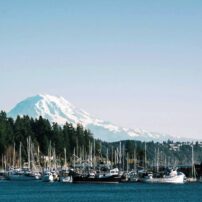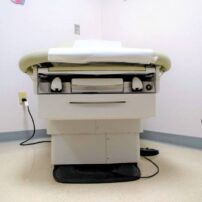With our home office based on the Kitsap Peninsula, The Content Scout is reminded daily just how lucky we are to have the ease of spending on time to work and play out on the water. Feeling ever so fortunate to not only live here, but have the ability to launch a kayak, hop a ferry to Seattle or take our skiff to dinner, all connected by water.
After shuttling our summer guests around to and through the ports of Bremerton, Kingston, Poulsbo and Manchester, something became strikingly apparent. Kitsap’s 13 ports are an integral part of the freedom residents enjoy when it comes to accessing the water here. Our local ports own and operate boat launches, marinas, waterfront parks and more.
Without the ports on the Kitsap Peninsula, the lifestyles of residents and visitors alike would not be nearly as rich. The role the Kitsap Peninsula ports play — as well as all 75 ports statewide — is vital. They knit each one of our unique communities together in stories of adventure, exploration, employment and economic development.
In an effort to showcase just how vital our ports are to West Sound and the role local ports play in so many facets of our everyday life, The Content Scout interviewed three key individuals at small, medium and large local ports. Their stories are all different, but have common threads — economic development and recreation. Read on and see how they help enhance our quality of life and make this the great place it is.
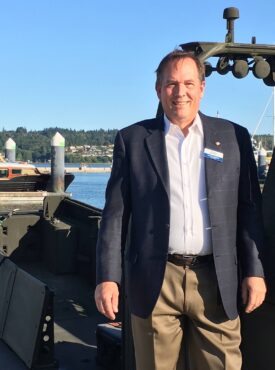
Axel Strakeljahn, Port of Bremerton
WestSound: The main job of every port is to create economic development. What has your port done to further this mission, and how do you specifically see your port accomplishing this?
Strakeljahn: As a commissioner for the largest port in Kitsap County, I am responsible for helping create family jobs and an environment that is conducive to constructing, relocating and growing businesses — both local and international. My private sector mantra of “We are open for business” has translated well to my responsibilities at the Port of Bremerton. During my two terms, we founded the Gorst Coalition to secure $74 million in funding to fix the Gorst traffic bottleneck, tripled the number of jobs at the port’s Industrial Center, brought Airlift Northwest’s life-saving operations to Bremerton National Airport, expanded Airport Industrial Way to accommodate companies such as Amazon and added over 50 units of workforce housing at the Marina Square project in Bremerton.
WestSound: What do you see as the primary way your port could become more effective and more involved in your community?
Strakeljahn: Ports are not always front-page news, but when the impact is over $1.3 billion in annual Kitsap County sales revenues, it should be big news for every community from Bainbridge Island to Olalla. I see added value in improved communication and outreach with the Chambers of Commerce, local community centers, the Kitsap Economic Development Alliance and the general public at various community events throughout Kitsap.
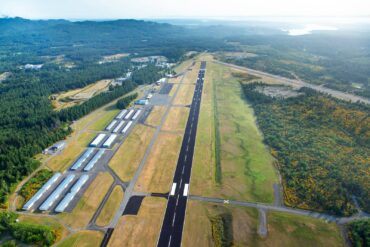
(Photo courtesy Andrew Buchanan, Subtle Light Photography)
WestSound: In some places — especially where there are no other local government facilities or presence — port facilities are considered community “hubs,” where local residents can gather for events and other reasons. Does your port have such a facility, and if so, how do you envision its use being improved? If not, where do you see the best place in your port district such a hub could be established?
Strakeljahn: At the Port of Bremerton, we have several such “hubs” for community gatherings. They not only feed tourism and generate additional commerce for local businesses — they also create added tax revenues for our communities. These include the marinas and Bremerton National Airport, which are utilized by a variety of local and visiting organizations. We have created an outreach program through various web, social media and email platforms to promote events that occur on port property. These events attract tourism and related entertainment dollars, while also supporting many small businesses in Kitsap.
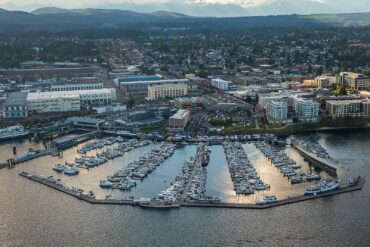
WestSound: Many port activities and actions happen “under the radar” because most citizens don’t understand what exactly it is ports do or what their mission is. How do you envision your Port educating citizens in your district on what ports do?
Strakeljahn: The Port of Bremerton is a quiet economic machine, currently driving $1.3 billion in annual sales revenues to the Greater Kitsap region. We are the second largest economic driver in Kitsap. We did not slow down during the pandemic; to the contrary, we hustled to keep up with the new companies and jobs from our infrastructure expansion that brought Amazon to our neck of the woods.
The port has its own marketing coordinator, who is charged with oversight of our web- and print-based communications. These materials are shared broadly with local constituents and regional supporters. Our bi-monthly meetings are made available to the public via BKAT television and Zoom. Transparency is a top priority and citizen involvement and input are always welcome, either in-person or virtually. We strive to work in the best interest of the community and the citizens we serve.
WestSound: How do you see your port becoming more transparent and encouraging citizen input and participation in the port’s mission?
Strakeljahn: The things we are currently doing have proven quite successful, and we intend to continue doing them. Citizen input is not only welcomed, but encouraged. The email addresses and phone numbers of the commissioners are published on our website and we are always open to hearing from the taxpayers we work for.
WestSound: What are the top three things you believe your port can do to improve its economic performance and accomplish what it is meant to do?
Strakeljahn: As the largest industrial center west of Seattle, we must assume the leadership role in attracting businesses through outreach, attendance and engagement. We must focus on cluster opportunities in defense, maritime and space that are a strong fit for our region. The port’s director of development is crucial to helping us grow existing businesses and attract solid companies from a diverse range of industries at local, national and international levels. We need to expand marketing of the port’s Industrial Center, Kitsap County’s skilled labor force and our overall quality of life to ensure continued economic growth.
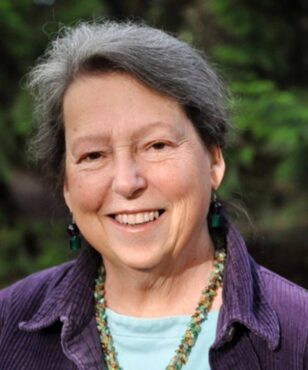
Mary McClure, Port of Kingston
WestSound: The main job of every port is to create economic development. What has your port done to further this mission, and how do you specifically see your port accomplishing this?
McClure: The Port of Kingston recognizes its role as a transportation hub for the Washington State Ferries and Kitsap Transit’s passenger ferry; we work with those agencies to provide safe, convenient boarding and parking facilities. The marina is a center for tourism and recreation. And we are currently in the process of redevelopment of the port properties to enhance people’s experience and activities. An important aspect of that redevelopment is to build complement and catalyze Kingston’s business district.
WestSound: What do you see as the primary way your port could become more effective and more involved in your community?
McClure: More strategic partnerships with the agencies and community groups that affect Kingston, especially as our population and business community continue to grow.
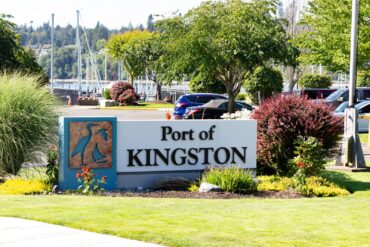 WestSound: In some places — especially where there are no other local government facilities or presence — port facilities are considered community “hubs,” where local residents can gather for events and other reasons. Does your port have such a facility, and if so, how do you envision its use being improved? If not, where do you see the best place in your port district such a hub could be established?
WestSound: In some places — especially where there are no other local government facilities or presence — port facilities are considered community “hubs,” where local residents can gather for events and other reasons. Does your port have such a facility, and if so, how do you envision its use being improved? If not, where do you see the best place in your port district such a hub could be established?
McClure: Port of Kingston’s waterfront Mike Wallace Park is just such a facility. We partner with our Chamber of Commerce, Rotary and Kiwanis, Kingston Cove Yacht Club and the Kingston Public Market to provide many events and activities for residents and visitors alike. Well-known examples are the Kingston 4th of July celebration and the winter holiday lights at the port. Most weekends feature some activity.
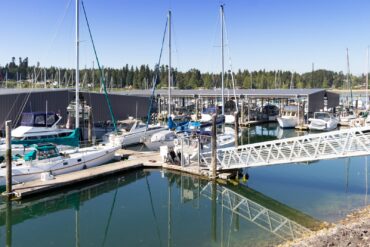
WestSound: Many port activities and actions happen “under the radar” because most citizens don’t understand what exactly it is ports do or what their mission is. How do you envision your port educating citizens in your district on what ports do?
McClure: The Port of Kingston regularly writes and publishes an insert in the local newspaper describing and explaining issues and actions on the port’s docket. And importantly, when the port is working on a significant project, we actively seek the community’s perspectives and input, which in turn gets information about the port’s plans and activities into the public eye.
WestSound: How do you see your port becoming more transparent and encouraging citizen input and participation in the port’s mission?
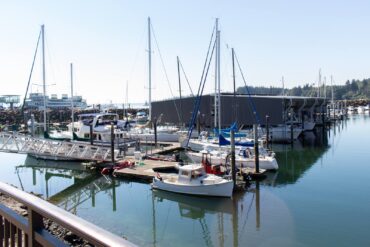
McClure: In addition to the efforts described above, we hold weekly commissioners’ work sessions, which we encourage people to attend. This aspect of the port’s work is very important and we frequently consider additional ways to accomplish it.
WestSound: What are the top three things you believe your port can do to improve its economic performance and accomplish what it is meant to do?
McClure: First, support the existing and developing business community through partnerships and strategic development. An important aspect of this is working with other agencies (Kitsap County, WSDOT, Kitsap Transit) in securing ferry traffic relief. Second, consider including facilities such as workspaces (think Vibe Coworks in Poulsbo) in our development planning that support evolving workplace practices. Third, recognize the importance of parking for travelers/commuters, Kingston businesses and local residents as the port facilities are redeveloped.
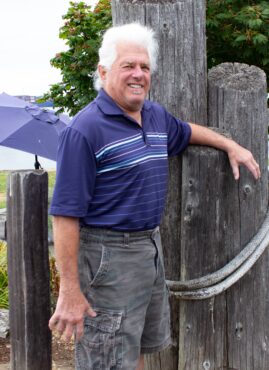
Jim Strode, Port of Manchester
WestSound: The main job of every port is to create economic development. What has your port done to further this mission, and how do you specifically see your port accomplishing this?
Strode: Manchester is a small port, but we see it accomplishing this as best we can with our limited resources. For example, The Port of Manchester purchased a piece of commercial property contiguous to the port-owned property next to the library for future development. Preliminary plans for retail space and a community center have been drawn.
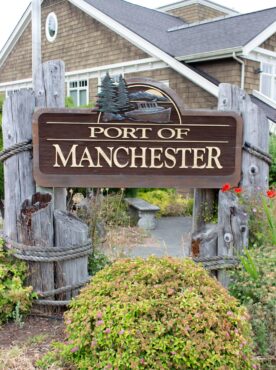 WestSound: What do you see as the primary way your port could become more effective and more involved in your community?
WestSound: What do you see as the primary way your port could become more effective and more involved in your community?
Strode: The port is very effective in the community. The Manchester Library is on port property and we lease it for $10 a year to the Friends of the Manchester Library.
WestSound: In some places — especially where there are no other local government facilities or presence — port facilities are considered community “hubs,” where local residents can gather for events and other reasons. Does your port have such a facility, and if so, how do you envision its use being improved? If not, where do you see the best place in your port district such a hub could be established?
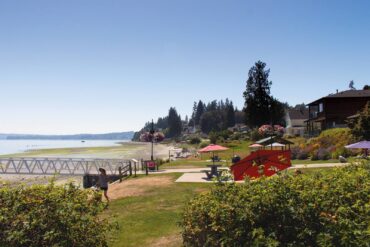
Strode: As I stated previously, we have a vision to establish a 7,000-square-foot building that would provide 3,500 square feet of commercial space and a 3,500-square-foot community center that could be rented for events such as weddings, parties, business meetings, small conventions, etc.
WestSound: Many port activities and actions happen “under the radar” because most citizens don’t understand what exactly it is ports do or what their mission is. How do you envision your port educating citizens in your district on what ports do?
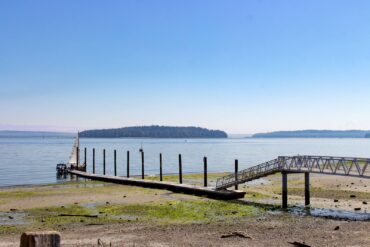
Strode: Through articles like this one. However, Manchester residents are also very educated on this port and regularly attend our meetings and ask questions about the port’s activities.
WestSound: How do you see your port becoming more transparent and encouraging citizen input and participation in the port’s mission?
Strode: We encourage more citizens to attend the monthly port meetings; the meeting times are advertised at the Manchester Post Office and on our website. The commissioners also urge the community to ask questions and participate in discussions about future port projects.
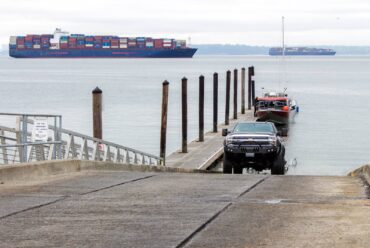
WestSound: What are the top three things you believe your port can do to improve its economic performance and accomplish what it is meant to do?
Strode: The top three things we believe this port can do to improve its economic performance are:
- Discuss the millage rate charged to taxpayers; it’s one of the lowest of all ports in the county.
- Ask taxpayers for input on how the port can benefit the community more.
- Educate the citizens on how this port is unique and differs from any other ports in the county.








